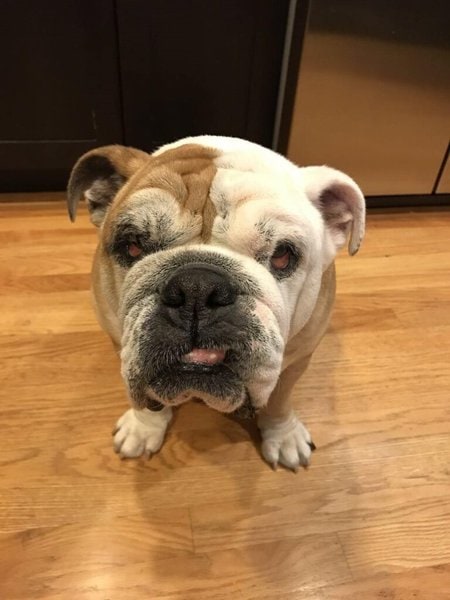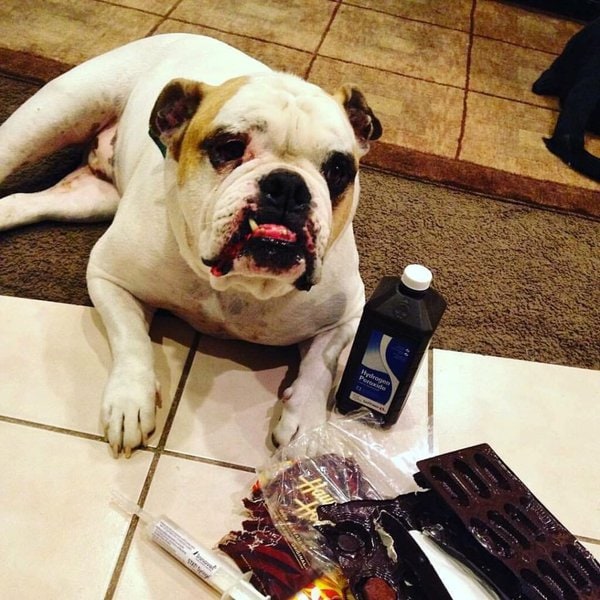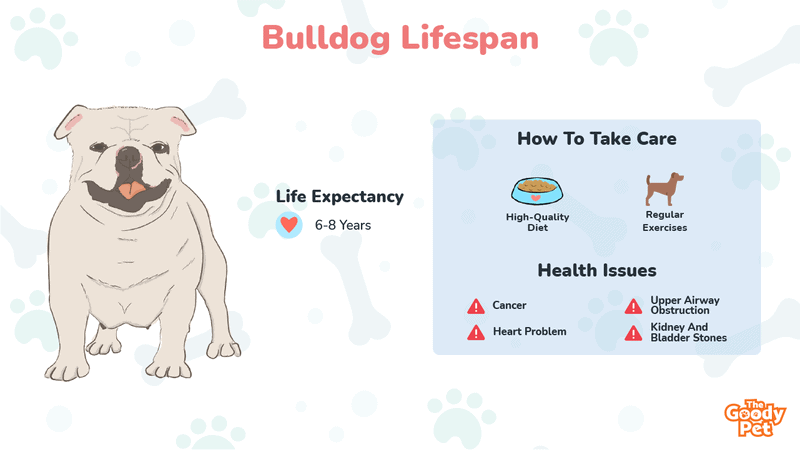Bulldogs are one of the most popular dog breeds in the US. Unfortunately, these adorable dogs are also highly prone to various health issues, which often lead to a shorter lifespan compared to other dogs. So, what are the common health issues among Bulldogs?
Bulldogs have a high risk of developing health issues, such as respiratory problems, immune conditions, and the inability to give birth naturally. These health issues were brought about by the selective inbreeding that gave Bulldogs the appearance that people love them for.
Before buying a Bulldog, it is important to be aware of the health issues that you need to keep an eye out for. In this article, we’ll cover everything about Bulldogs’ health, including the common diseases that Bulldogs die from, how to know when a Bulldog is dying, and how to keep your Bulldog healthy. Before that, however, let’s take a look at the lifespan of the Bulldog and why it is so short.
Why Do Bulldogs Have A Short Lifespan?
Various studies have found that the average lifespan of an English Bulldog lies between 6 to 8 years.
For example, this study conducted in 2010 found that the median age of Bulldogs at death is just 6.29 years, which was among the lowest for all the dogs involved in the study.
A lifespan of 6 to 8 years is about 30% shorter compared to the average lifespan of most other dog breeds. So, why do Bulldogs have such a short lifespan?
Inbreeding
One of the main reasons why Bulldogs have such a short lifespan is because of inbreeding. Several decades ago, Bulldogs were very healthy and strong dogs with long lifespans. Over time, however, breeders started selectively breeding these dogs in favor of short, stocky bodies, a squished nose, and folded, wrinkly skin.
This selective inbreeding resulted in faulty genes getting concentrated within the breed, something that has led to Bulldogs being highly vulnerable to multiple health conditions. This has made Bulldogs among the worst breeds when it comes to health and life expectancy, especially that of English Bulldogs.
Life-Threatening Health Problems
While some of the health problems that affect Bulldogs are treatable or manageable, some often lead to death. If you browse various online forums, you’ll notice a high number of Bulldog owners asking why their Bulldog died suddenly. We’ll cover some of the common diseases that lead to eventual death in Bulldogs later in the article.
Due to their high risk of disease and illness, it is advisable to schedule routine health checkups with your vet, especially as your Bulldog grows older. This way, any health problems affecting your Bulldog can be detected at onset and treated before they turn into life-threatening conditions. This can go a long way in increasing the lifespan of your Bulldog.

What Do Bulldogs Usually Die From?
Bulldogs can get sick quite often, and in many cases, some of these illnesses can eventually lead to the death of your Bulldog if they don’t get medical attention quickly. Some of the diseases and conditions that usually cause death in Bulldogs include:
Upper Airway Obstruction
One of the most adorable features of the Bulldog is their short, squished nose. Unfortunately, this same feature puts Bulldogs at great risk.
Despite having a short nose, Bulldogs have the same amount of tissue in their airways, and because this tissue is confined within a small space, it causes obstruction within the airways. Not only does this cause breathing problems among Bulldogs, it poses a huge difficulty for them to regulate their body temperature.
Both respiratory problems and inability to regulate body temperature are potentially life-threatening if emergency medical attention is not provided quickly.
Cancer
Due to their very low genetic diversity, Bulldogs are also highly susceptible to cancer, especially in old age. Unfortunately, most cancers are untreatable and will eventually lead to death. Actually, cancer is one of the most common causes of death in Bulldogs.
Some cancers that Bulldogs get commonly are mast cell tumors, skin cancer, oral malignant melanomas, and lymphomas.
Kidney And Bladder Stones
Bulldogs also face a high risk of developing stones in the kidney or bladder, with the risk being higher in females than females. Kidney and bladder stones are a very serious condition that comes with a lot of pain, especially during urination.
Left untreated, kidney and bladder stones will cause complete obstruction and eventually result in death. Fortunately, when detected early, kidney and bladder stones can be removed, either through medication or surgical operation.
Other Conditions
Other medical conditions that can cause death in Bulldogs include heart problems, gastrointestinal issues, aspiration pneumonia, and heat stroke. English Bulldogs are also very likely to go blind.

Learn To Read The Danger Signs – How Do You Know When A Bulldog Is Dying?
If you have a Bulldog with a chronic health condition, there are several ways to tell if your four-legged buddy is going through the last days of their life. Some of the signs that a Bulldog is dying include:
Loss Of Interest
Every dog has things that interest them – their favorite human, an activity that they enjoy, their favorite toy or treat, and so on. However, if you notice that your Bulldog has suddenly become disinterested in things they used to cherish, this is a sign that their brain is shutting down, and their time is almost up.
Extreme Fatigue
Bulldogs are naturally lazy and will spend a lot of time sleeping or lounging. Even then, they’ll have periods where they get up for a moment of play, or just to follow you around.
If your Bulldog becomes too lazy to engage in any activity, this is another sign that your canine buddy is dying. Such dogs will usually only get up to feed or take a potty break.
Crying And Howling
If they have a chronic illness or condition, your Bulldog will suffer and feel pain as their final days approach. Sometimes, the pain becomes too much, and in such cases, you’ll hear your Bulldog crying and howling in pain.
Bowel And Bladder Incontinence
If a Bulldog that has been critically ill loses control over their bowel and bladder movements, it is very unlikely that they have much longer to live. This often causes the Bulldog to stink. Loss of bowel and bladder control is a sign that your dog’s organs and muscles are shutting down.
Odd Breathing
Bulldogs normally experience breathing problems, even when they are fully healthy. However, when a Bulldog is near the end of their life, their breathing will become more strained, shallow, and uneven.

How Can I Keep My Bulldog Healthy?
Despite the health problems that affect Bulldogs, it is still possible to keep your Bulldog healthy and extend their lifespan with proper care. Some things to keep in mind when it comes to caring for your Bulldog include:
Diet
Diet has a huge influence on your dog’s health. If you want a healthy dog, you have to provide them with a high-quality diet rich in nutrients. For this, we recommend food from Pet Plate, which is delicious, nutritious, and rich in protein. You also get to choose from 4 tasty options – beef, chicken, turkey, or lamb.
Aside from high-quality food, you should also give your Bulldog multivitamin supplements to provide them with essential vitamins that are crucial for fighting disease. A good option is Multivitamin Treats Supplements – Zesty Paws Probiotics, which is rich in vitamins and probiotics that enhance your doggie’s immune system.
Exercise
Despite having a reputation for being lazy, Bulldogs still require physical activity for good health. Therefore, you need to ensure that your Bulldog gets at least half an hour of physical activity every day. To avoid exerting your Bulldog too much, you can divide this into two sessions.
Due to the temperature regulation problems that are rife in Bulldogs, never engage your Bulldog in intense physical activity when the temperatures are high. Early morning and early evening are perfect times for exercising your Bulldog.
Do Bulldogs Need A Lot Of Water?
Water is also an important part of keeping your pooch healthy. On average, you should give your Bulldog between 0.5 and 1 fl oz of water for every pound of body weight. Giving your fido enough water will help prevent issues like dehydration, which can cause kidney stones.
Since Bulldogs are highly prone to dental problems, you should also invest in dental water additives for improved oral hygiene.
Related Questions
Are Bulldogs Mutated? Bulldogs are not mutated. However, inbreeding within the breed has resulted in a breed that has a very narrow genetic makeup. This lack of genetic diversity is what contributes to the wide range of health issues that Bulldogs are susceptible to. Unfortunately, their genetic makeup cannot be improved without diluting their pedigree.
What Is The Healthiest Bulldog Breed? The Olde English Bulldogge is the healthiest Bulldog breed. This is because the Olde English Bulldogge was specifically developed to create a dog with as much similarity with the original English Bulldog that is now extinct, without any of the health problems that plague the modern Bulldog.
Why You Shouldn’t Buy A Bulldog? Owing to the myriad of health issues affecting Bulldogs, you should not buy a Bulldog if you are not ready to provide them with the high level of care that they require. You should also keep in mind that taking care of a Bulldog can get quite expensive, so don’t buy one if you’re not ready financially.





